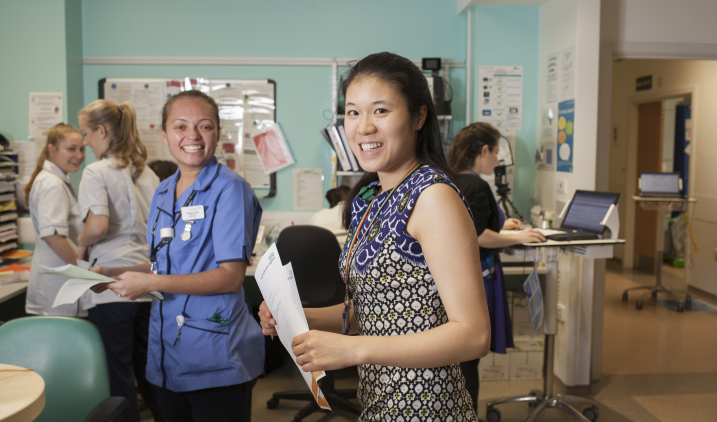Clinical pharmacology and therapeutics
Clinical pharmacology and therapeutics doctors promote and ensure the safe, economic and efficient use of medicines to improve patient care.
You’ll provide specialist advice to colleagues and patients to help improve the outcome of a patient’s treatment and overall experience.

Life as a clinical pharmacologist
Often a patient will have complex health problems and you’ll be expected to recommend the correct medicine and its usage, delivering guidance on the interaction of different medicines and how they may affect a patient.
Medicine management is central to your role, and you’ll be expected to advise on patients with complex conditions that affect multiple organ systems and, therefore, need several different medicines.
You’ll give guidance on the safe prescription of medicines with the goal of achieving maximum benefit for a patient.
Many patients are admitted to hospital because of poisoning, often caused by the misuse of prescription medicines. Clinical pharmacologists with toxicology expertise work in specialist poison centres and provide advice to staff in A&E and intensive care units.
Common procedures and interventions include:
- safe prescribing, reviewing and monitoring of appropriate drug therapies in many different disease areas
- developing treatment plans incorporating lifestyle and pharmacological therapy in prevention of many diseases, in particular cardiovascular disease
- using your knowledge and experience of toxicology to assess and manage the clinical care of patients poisoned by drugs or other chemicals at work or in the environment and those patients who have been abusing drugs such as alcohol or opiates
- undertaking and interpreting the results of clinical trials to evaluate what a drug is doing to the body (pharmacodynamics) or what happens to the drug in the body (pharmacokinetics), and how it works in terms of treating a particular disease. Trials may be undertaken at all stages, including once the drug has been licensed
You will be based in a hospital but you might also work in community settings, running clinics for patients with hypertension (high blood pressure) or for those at risk of having a stroke or heart disease.
As your career develops, you may hold academic roles, work in industry or for government agencies.
How much can I earn?
How about the benefits?
- make a difference
- flexible and part-time working
- high income early in your career
- work anywhere in the world
- excellent pension scheme
- good holiday entitlement
- NHS discounts in shops and restaurants
Must-have skills
- excellent communication skills to manage a wide range of relationships with colleagues, and patients and their families
- emotional resilience, a calm temperament and the ability to work well under pressure
- teamwork and the capacity to lead multidisciplinary teams
- problem-solving and diagnostic skills
- outstanding organisational ability and effective decision-making skills
- first-class time and resource management for the benefit of patients
In addition, clinical pharmacologists need to demonstrate:
- an interest in research and clinical trials
- the vision to see how a concept developed in the laboratory can improve clinical outcomes
Entry requirements
If you already have a degree, you could study for a four-year postgraduate degree in medicine.
You’ll need to pass an interview and admissions test. You’ll be asked to show how you demonstrate the NHS values such as compassion and respect.
Some medical schools look to recruit a mix of students from different backgrounds and geographical areas, so your educational and economic background and family circumstances could be considered as part of your application.
"Research is a vital part of my job and I have contributed articles to various scientific journals. One of my interests is pharmacovigilance, to ensure the safety of medicines and to identify and try to minimise adverse drug reactions."
What are my chances of starting a career in a clinical pharmacology?
How to become a clinical pharmacologist
After your foundation programme, you can apply for paid specialty training to become a clinical pharmacologist, which will take a minimum of seven years.
You may be able to train part time, for example for health reasons or if you have family or caring responsibilities.
Where a career as a clinical pharmacologist can take you
- specialise in toxicology or cardiovascular risk management or conduct research
- teach medical students or postgraduate students in training
- get involved in research at universities, the NHS or private sector